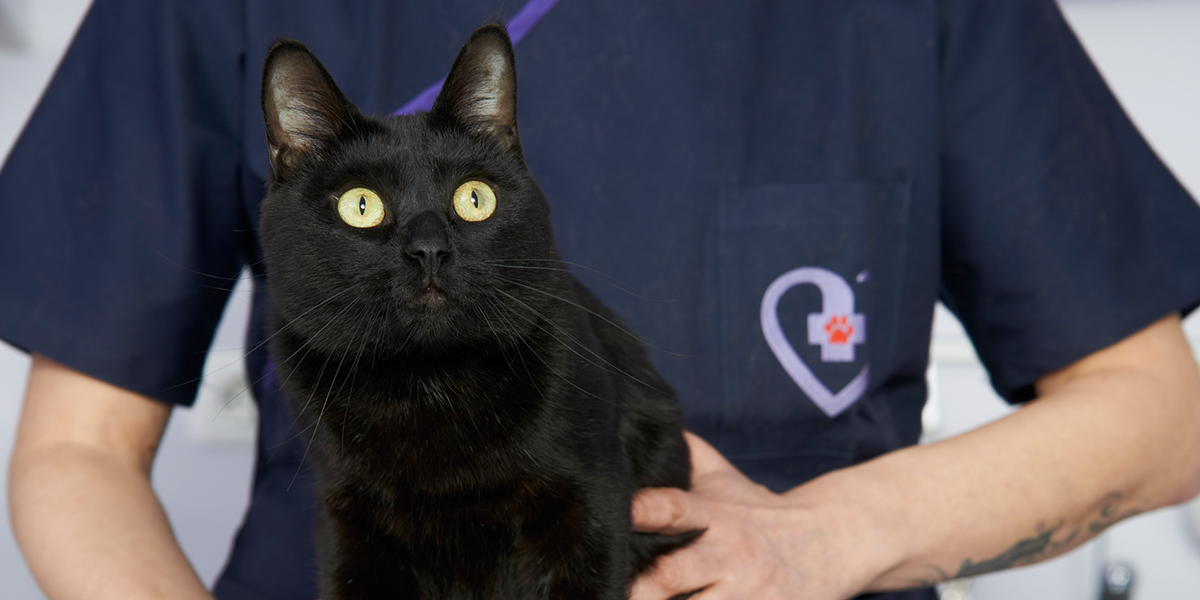When you need to take your cat to the vet, either for a regular health check or because you suspect something is wrong with your cat, it is important to choose a good clinic. Depending on where you live, the vets available to you may or may not have had a great deal of training on cats, but many vets are increasingly passionate and knowledgeable about cats.
You may already go to a clinic that you are very happy with, or you may have had a clinic recommended to you by a friend or relative, which is always a good starting point, but what else can you look out for? You will want to find a clinic where they make efforts to minimise the stress of the visit for the cat, and where you will find a good vet.
What to look for in a good veterinary clinic
It is always best to try to decide which veterinary clinic you are going to use in advance of any specific need. Finding a good clinic may be much harder if you are faced with needing to find a vet urgently, as you will not have time to look into the differences between clinics. The following pointers should help you choose:
Have a look around the clinic
Contact the clinic and explain you are looking for a clinic where you can take your cat, and ask if you can go and visit (without your cat) and have a look around. Most vets will be more than happy to show you around the clinic and allow you to see what facilities they have. Think of it from your cat’s point of view as well, and whether you think he or she would be comfortable there. Remember that different clinics may have different facilities and different approaches to cats and their owners.
Ask if the clinic is an ISFM Practice Member
The International Society of Feline Medicine (ISFM) is the veterinary division of International Cat Care. ISFM offers Practice Membership to clinics – if they are members they have a certificate they can put up in the waiting room and you will know that they are regularly getting access to high-quality information on the latest developments in the veterinary care of cats.
Ask if the clinic is an ISFM Accredited Cat Friendly Clinic
The work International Cat Care has done has highlighted the need for veterinary clinics to be ‘cat friendly’. ISFM now run a Cat Friendly Clinic programme that specifically encourages clinics and the veterinary staff in clinics to be more ‘cat friendly’ and to have facilities and attitudes that help to reduce the stress of a veterinary visit for your cat. Accredited Cat Friendly Clinics have had to achieve minimum standards that help ensure your visit is as pleasant as possible for both you and your cat. Find out more about the Cat Friendly Clinic programme here, and you can also see a list of accredited Cat Friendly Clinic here. If the clinic belongs to our Cat Friendly Scheme, they will also have a cat advocate in the clinic who works to improve the cat care – you can speak to them and ask them any questions you may have.
Ask if any of the vets is a member of the ISFM Academy of Feline Practitioners
Just like medical (human) doctors, many veterinarians undertake further studies after they have graduated so that they can develop deeper knowledge in certain areas. Membership of the ISFM Academy of Feline Practitioners is awarded to vets who have undertaken certain further qualifications to demonstrate their additional knowledge in the care of cats.
-
Ask if any of the nurses or technicians have done the ISFM Certificate or Diploma in Feline Nursing
Similar to vets, nurses and technicians can do further study to gain knowledge in different areas. Nurses and technicians who have done the ISFM Certificate or Diploma in Feline Nursing will have a much greater understanding of, and knowledge about cats.
Although there is a lot to take in when choosing a veterinary clinic for your cat, ISFM (the veterinary division of International Cat Care) is at the forefront of trying to improve both veterinary knowledge and improve the quality of care for cats and cat owners in the clinic. Looking for a clinic that meets some or all of the above criteria will mean that you have peace of mind when it comes to taking your cat to the vet.
Signs of a good cat friendly clinic
Waiting room
Many clinics offer a separate waiting area for cats, away from the stress of the sight, sound and smell of dogs. This is hugely beneficial – see if your clinic offers this. Having shelves, benches or chairs so that the cat basket can be raised off the floor also helps by making the cats feel more secure and less vulnerable. Avoiding visual contact between cats, even with a clean towel or blanket over the cat basket, will also help cats relax. As an alternative to a separate area in the waiting room, some clinics offer cat-only consultation times to avoid cats having to be in a dog-filled waiting room.
Attitude of staff
We hope that all staff in the clinic, from the vet through to the receptionist know and understand the important differences in dealing with cats. Sadly this is not always the case, but you can tell a lot by the greeting you receive, the questions that are asked, and the suggestions that are given when you first go to the clinic.
Cat information
Look out for good information about cats in the clinic too … does the clinic provide leaflets and help on things like transporting your cat, giving your cat medications etc.
If the clinic has a positive attitude to cats and the staff are proactive in minimising stress, this should do much to make the cat’s visit much more relaxing.
Using cat friendly pheromones
The clinic may well use synthetic feline pheromones (these are chemicals very similar to those produced by the cat itself to communicate with other cats) to help make cats feel more relaxed. You won’t smell these, but your clinic may use a Feliway® diffuser plugged into a socket, or a spray in the waiting room and consultation room.
You should look for a clean waiting room and consultation room, but preferably without an overpowering smell of disinfectant (which could be stressful for a cat).
Getting the cat out of the basket
Your vet will want to examine your cat, but see how they approach this. A good vet that understands cats will usually simply open the door or lid of the basket, and while talking with you will see if the cat will come out of the basket by itself. He or she may even be able to do some of the examination while the cat is still in its basket (especially if the lid or top comes off). Sometimes a cat will not voluntarily come out of a basket – if your vet needs to lift them out make sure they do it gently and with respect. It can sometimes be helpful to have plenty of bedding in the basket so that both the bedding and cat can be lifted out together.
Friendly handling
Vets and nurses who know understand cats will adopt the ‘less is more’ approach. Cats try to avoid danger – they often panic if they’re restrained very firmly and realise they cannot escape. The art of cat examination is to do the minimum, to get as much done as you can, confidently and gently, without too much restraint, and to leave anything that may upset the cat until the very end. Avoiding direct eye contact with the cat (and doing a lot of the examination with the cat facing away from the vet) also helps to reduce stress, as does taking breaks and letting the cat find where they are most relaxed (even on a windowsill or on the floor for example). A rubber mat on the table (or the cat’s bedding or blanket) is extremely helpful to avoid a slippery surface that the cat has to stand on.
Cat comfort
Many of the other things which make a veterinary clinic cat friendly will be going on behind the scenes, such as having a hospitalisation ward just for cats (without barking dogs!), and comfortable cages (with somewhere to hide, and warm cosy bedding). Simple things make a big difference and never be afraid to ask your vet if you can have a look at where your cat will be kept if he or she needs to stay in the clinic.
Good hygiene
Hygiene is very important and the reception area and consulting rooms should be clean and well maintained. All the staff should be wearing clean uniforms and should be courteous and well trained. The clinic should be well ventilated and largely odour-free.
Important things to ask
It is worth finding out some important bits of information at the start, which may be very helpful to you, and check on the following:
- What arrangements are there for emergencies? Find out what these are, whether they are acceptable to you, and how you would contact the clinic in an emergency (when it is closed).
- What facilities does the clinic offer? Things like access to an X-ray machine, an ultrasound machine or laboratory tests.
- Can the clinic measure your cat’s blood pressure?
- What equipment is available to monitor a cat when it is anaesthetised for an operation?
- What equipment does the clinic have for cleaning teeth or other dental work?
Your vet should be pleased to talk to you about all these things and what their clinic has to offer, and the measures they have taken specifically for cats. Ask the clinic about how cat friendly they are – they should be only too pleased to tell you!
Support your local cat friendly clinic
If you find that your clinic has made great efforts to improve both your and your cat’s experience of visiting the vet, then let them know, and tell your cat enthusiastic cat friends too. Giving good feedback will encourage the clinic to do more, and to give you and your cat even better care!
Thank you for visiting our website, we hope you have found our information useful.
All our advice is freely accessible to everyone, wherever you are in the world. However, as a charity, we need your support to enable us to keep delivering high quality and up to date information for everyone. Please consider making a contribution, big or small, to keep our content free, accurate and relevant.
Support International Cat Care from as little £3
Thank you.
Donate Now


